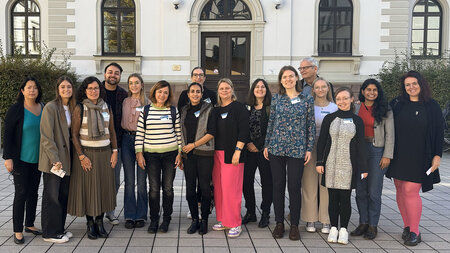Research Colloquium (Winter semester 2024/25)
Lecturer: Prof. Dr. Dr. Marco Ragni
On this page you will find the event schedule of the PVA Research Colloquium, in which the following are presented:
- current research results, conference papers and attended events
- final theses
- the research by invited guests
The events can be taken in the Sensors and Cognitive Psychology program.
- in the Bachelor's program SeKo after SO 2022 or 2023 (enrollment from WiSe 2022/23) as part of the module BSeKo-15 "Current research in the field of sensors and cognitive psychology".
- in the master program SeKo after SO 2022 or 2023 (enrollment from WiSe 2022/23) as part of the module MSeKo-09 "Master thesis".
In particular, you should attend the events if you are interested in writing a thesis at our professorship, but students from early semesters and other courses are also welcome.
We look forward to welcoming you to our research colloquium!
The current schedule can be found below. For any information please contact Sara Todorovikj or Jenny Rettstatt.
Colloquium
Time: Monday, 15:30 - 17:00
Place: 2/D301 (C24.301)
Webroom: Webroom Research Colloquium PVA
| Datum | Referent/in | Thema |
|---|---|---|
| 14.10.2024 | Internal meeting of the professorship. | - |
| 21.10.2024 | Internal meeting of the professorship. | - |
| 28.10.2024 |
Sophie Beims
Leon Cantow |
Presentation of the bachelor thesis "Evaluation des Einflusses der Modellerzeugungsphase der Mentalen Modell Theorie im syllogistischen Schlussfolgern" Experiment presentation |
|
04.11.2024 (Online) |
Calvin Deans-Browne (University College London) |
Prior Beliefs Play a Larger Role on Perceived Argument Quality Than does the Quality of the 'Everyday' Argument Itself |
| 11.11.2024 | More info to follow. | More info to follow. |
| 18.11.2024 |
More info to follow. |
More info to follow. |
| 25.11.2024 (Online) | Kai Preuss | Reasoning in 3D - Cognitive Models for Mental Spatial Transformation |
| 02.12.2024 | Participants of the course Cognitive Modelling | Individual presentations |
| 09.12.2024 | Participants of the course Cognitive Modelling | Individual presentations |
| 16.12.2024 | Nils Paweldyk | Experiment presentation (Master thesis) |
| 06.01.2025 | Sara Todorovikj | Presentation of the ongoing research |
| 13.01.2025 (Online) | Laura van de Braak | More info to follow. |
| 20.01.2025 | More info to follow. | More info to follow. |
| 27.01.2025 | Internal meeting of the professorship. | - |
| 03.02.2025 | Marie Jakob | More info to follow. |
Abstracts of the presentations
04.11.2024 - Calvin Deans-Browne
Prior Beliefs Play a Larger Role on Perceived Argument Quality Than does the Quality of the 'Everyday' Argument Itself
Social media has changed the amount of information we have access to and the type of information we see. For example, individuals often publicly debate topics important to them on social media, and while one individual might be convinced by what a social media user has to say, another individual might be left unpersuaded. We are interested in what makes an ‘everyday’ argument like those found on social media persuasive to one person but not another. In two experiments, participants rated their beliefs about various political claims (e.g., ‘abortion should be legal’) and evaluated the quality of ‘good’ and ‘bad’ arguments about these claims. These ‘everyday’ arguments were designed to be like those seen on social media, with good and bad arguments manipulated to have either strong or weak evidence supporting their conclusions respectively. We find that participants consistently rated good arguments as better than bad arguments, but their argument quality ratings were also strongly correlated with their beliefs. Participants on average perceived arguments as being of better quality if it was also in line with their prior beliefs, with this overall effect of belief being around 3 times larger than the effect of argument quality itself. This finding was robust even when we controlled for potential order effects and demand characteristics; participants used their beliefs to assess the quality of the arguments despite being told explicitly not to, which they did irrespective of whether they saw the arguments before or after they rated their beliefs about the political claims. Our findings highlight that the same information can be perceived differently depending on a person’s prior beliefs.
25.11.2024 - Kai Preuss
Reasoning in 3D - Cognitive Models for Mental Spatial Transformation
Spatial reasoning, not unlike syllogistic reasoning, concerns cognitive processes gauging visual relationships between objects. In spatial transformation research specifically, tasks require mentally simulating to change a presented object to make an informed decision. While mental spatial transformation experiments are well known (e.g., the mental rotation paradigm standardized by Shepard & Metzler (1971)), the exact cognitive mechanisms governing 3D reasoning are still unclear. To get a better idea, we recorded EEG from 3 different experiments, and used ACT-R with a new, dedicated spatial module to create cognitive models of these tasks. Here, I will present these3 tasks requiring mental spatial transformation in 3D space -- mental rotation, mental folding, and combined mental rotation and folding -- and the experiments and cognitive models created for these tasks. Comparing both human and model datasets gives insight into cognitive stages, neural substrates and functional connections specific to spatial cognitive processing, and could maybe even hold true for every-day reasoning in general.






